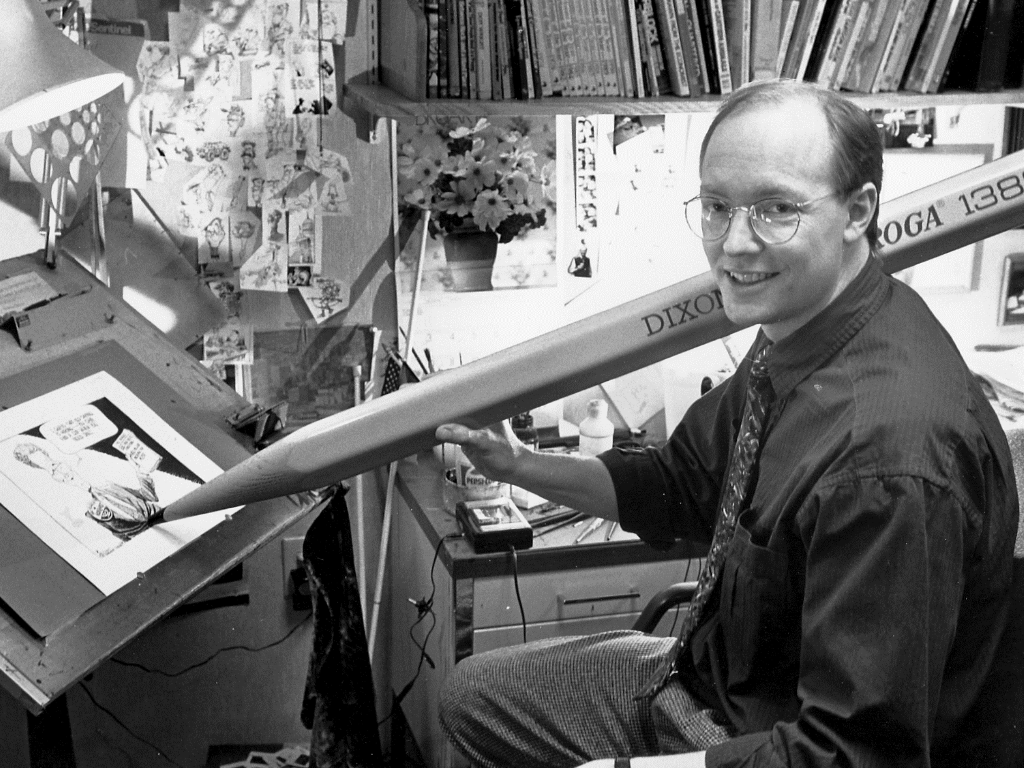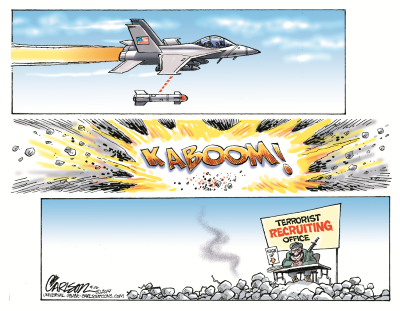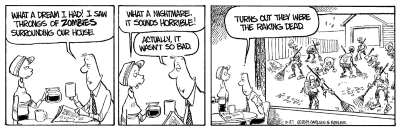Whatever Happened to Stuart Carlson?
Longtime Journal Sentinel editorial cartoonist is still syndicated nationally. But he misses that local connection.
Stuart Carlson has a great sense of humor, something you’d expect from a professional cartoonist, but he could be forgiven for having a more downtrodden attitude considering he was one of casualties of the Journal Sentinel’s Great Purge of 2008, when a long list of journalists were let go.
He worked for the newspaper and its predecessor Milwaukee Sentinel for “almost exactly 25 years,” he recalls. “When I left in 2008 that pretty much ended the long history that newspapers had of having on-staff political cartoonists. At the Journal Sentinel that tradition went back to the 1930’s,” Carlson says. “I think something like 35 other newspapers got rid of their cartoonists at the same time. Cartoonists were easy for papers to jettison. And who could have foreseen the massive collapse of newspapers? It’s just phenomenal.”
“It’s not like they were going to cut back on their coverage of the Packers,” Carlson says, laughing. “And all a political cartoonist does is piss people off. I wasn’t coming from a conservative, right-wing perspective and I think that’s the demographic a lot of papers want to appeal to because that’s where the readership is growing.”
But Carlson has never been afraid to ruffle the feathers of those right-leaning readers with his political cartoons. “If you’re doing your job right as a political cartoonist, then you’re alienating somebody,” he says. “The only way to avoid pissing people off is to be bland and say nothing and then you’re not doing your job.”
And political cartoons are the perfect avenue through which to elicit immediate impressions.
“With an editorial or political cartoon you only have a few seconds to grab the reader’s attention and make your point,” he says. “It’s not really a persuasive vehicle. The best outcome is when people see one of my comics and say, ‘Well, I still disagree, but I didn’t think of that angle until I saw the cartoon.’ I always thought it was a great compliment when people would say, ‘I really disagree with you, but you made a good point.’ Or, ‘I disagree with you, but you made me laugh.’”
Carlson’s work has been nationally syndicated since 1991, the year he was named the nation’s best cartoonist by the National Press Foundation. Universal Uclick (formerly Universal Press Syndicate) distributes his work to roughly 35 papers. He also runs his own website, www.CarlsonToons.com.
These days Carlson is his own boss, working out of his “maintenance-intensive Victorian home” and penning thrice-weekly political cartoons that are timely, funny, and critical. He culls his material from several sources, like the New York Times and (Carlson reluctantly admits) the Huffington Post, which publishes, “quality Paul Krugman articles next to something about side-boobs,” he quips.
“Each morning I get together with myself and we have a chat,” he says, describing his creative process. “And we decide how we feel about stuff. If we want to be critical of the president then we are, but it’s not because some editor says we ought to be.”
No subject is off limits and Carlson is not shy about his political views. He’s taken on the recent failures of the Secret Service, comparing them to Swiss cheese and a sieve. He suggests the Climate Change Summit has merely created another level of hot air in the atmosphere—the “rhetoric layer.” And Carlson finds hilarity in our hyperconnected iWorld with a clever ‘toon about a well-dressed couple in the year 2020, decked out in iGlasses, iTeeth, an iSportsBra, and iBriefs.
Carlson has also achieved that illusive level of immortality that comes from going viral, discovering that one of his older pieces had been enjoying a new life via forwarded emails. He believes that social media is the perfect vehicle for cartoons.
“Your stuff could be shared and go viral and you might never know or be credited,” he says. He recalls getting a call from someone in Arizona “basking in the warmth out there” who had seen one of his cartoons. “The cartoon is of a guy standing next to his car in the freezing cold and his ass has fallen onto the ground, like it’s literally frozen off. And the character in the cartoon says, ‘Gee, I always thought that was just a figure of speech.’ I had drawn that cartoon at least five years earlier. It was like a zombie cartoon. That’s the thing about having my work online—it never dies.”
But those un-dead creations typically don’t generate new revenue for cartoonists like Carlson.
“Do I get residuals from that? No.” he says. “I just get the warm, squishy feeling of knowing that I’ll be hit by a bus someday and be dead and my stuff will still be circulating on social media. People will remember me as the ‘Froze His Ass Off’ guy! That’ll be on my tombstone.”
He acknowledges that Internet virality is the highest compliment, today’s version of cutting a cartoon out of a newspaper and taping it to the fridge. He’d like his newest creation, the comic strip “Gray Matters”, to make the rounds on Facebook and in emails.
“In 2011, after a magazine job didn’t work out, my wife suggested I do a comic strip. I had never thought about doing a strip before, but I had nothing to lose,” he says. “Jerry Resler (a former Journal Sentinel journalist who wrote editorials) and I partnered up and we created this strip. It’s about aging baby boomers, so we’re writing what we know. It’s also a good demographic because who is reading newspapers these days? It’s the baby boomers.”
We can all relate to “Gray Matters”, though. The strip on October 4th, for instance, pondered how terrifying it would be to abandon our ever-present smartphones.
“’Gray Matters’ is moving along very slowly; we’re like salmon swimming upstream,” he says. “We started with a small local following and now we are syndicated online at Universal Uclick. It’s the same website that features ‘Calvin and Hobbes’ and ‘Peanuts.’”
Carlson hopes that “Gray Matters” will become syndicated in print newspapers across the U.S., but the chances are slim: Universal Uclick has only brought one comic strip to print syndication in the last three years. But he and Resler are entrepreneurial, attempting the self-syndication route and approaching newspapers on their own with the goal of being featured in at least a dozen of them. Currently they’re in the Kenosha News and the Arlington Daily Herald, the largest circulation paper in suburban Chicago. It’s extremely tough to break into a newspaper, though, since publishers are reluctant to anger octogenarians by replacing “Beetle Bailey” with more current offerings.
Perhaps Carlson should create a comics app, bucking his aging baby boomer status and becoming a tech whiz. “The whole app thing is out of control,” he says. “You’ve got Tumblr and Flickr and ShazzBot and SnapChat and FlipFlap and BlimBlam…there are so many and every day there are twelve more apps. Somebody could tell you, ‘Oh, I’ve got ChitChat and BipBap and Chumbawumba!’ and I wonder if these things are real. Are people just making this stuff up?”
It’s this kind of apropos humor that’s kept Carlson in the game for years. (Don’t get him started on the “Tweetification of language”.) He’ll continue drawing and pursuing his “small media empire” and more syndication opportunities. So feel free to send his work zooming out across the Internet. Share them widely—he’d love to meet a zombietoon years from now and earn another potential inscription for his tombstone.
City People
-
New Public Allies Leader Comes Full Circle
 Nov 2nd, 2021 by Sam Woods
Nov 2nd, 2021 by Sam Woods
-
Dr. Lester Carter, a Community Anchor for 47 Years
 Jul 2nd, 2021 by Damia S. Causey
Jul 2nd, 2021 by Damia S. Causey
-
Reuben Harpole Found His Purpose
 May 13th, 2021 by PrincessSafiya Byers
May 13th, 2021 by PrincessSafiya Byers

























